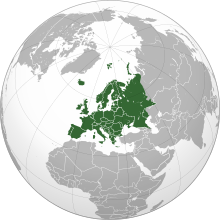Europe
From Wikipedia, the free encyclopedia
This article is about the continent. For the politico-economic union, see European Union. For other uses, see Europe (disambiguation).
 | |
| Area | 10,180,000 km2(3,930,000 sq mi)[n] (6th) |
|---|---|
| Population | 742,452,000[n] (2013; 3rd) |
| Pop. density | 72.9/km2 (188/sq mi) (2nd) |
| Demonym | European |
| Countries | ~50 countries (and ~5 with limited recognition) |
| Dependencies | 4 dependencies |
| Languages | ~225 languages[1] |
| Time zones | UTC to UTC+5 |
| Largest cities | |
Europe ( i/ˈjʊərəp/ or /ˈjɜrəp/[4]) is a continent that comprises the westernmost part of Eurasia. Europe is bordered by theArctic Ocean to the north, the Atlantic Ocean to the west, and the Mediterranean Sea to the south. To the east and southeast, Europe is generally considered as separated from Asia by the watershed divides of the Ural and Caucasus Mountains, the Ural River, the Caspian and Black Seas, and the waterways of the Turkish Straits.[5] Yet the borders of Europe—a concept dating back to classical antiquity—are arbitrary, as the primarily physiographic term "continent" also incorporates cultural and political elements.
i/ˈjʊərəp/ or /ˈjɜrəp/[4]) is a continent that comprises the westernmost part of Eurasia. Europe is bordered by theArctic Ocean to the north, the Atlantic Ocean to the west, and the Mediterranean Sea to the south. To the east and southeast, Europe is generally considered as separated from Asia by the watershed divides of the Ural and Caucasus Mountains, the Ural River, the Caspian and Black Seas, and the waterways of the Turkish Straits.[5] Yet the borders of Europe—a concept dating back to classical antiquity—are arbitrary, as the primarily physiographic term "continent" also incorporates cultural and political elements.
Europe is the world's second-smallest continent by surface area, covering about 10,180,000 square kilometres (3,930,000 sq mi) or 2% of the Earth's surface and about 6.8% of its land area. Of Europe's approximately 50 countries,Russia is by far the largest by both area and population, taking up 40% of the continent (although the country has territory in both Europe and Asia), while Vatican City is the smallest. Europe is the third-most populous continent after Asia andAfrica, with a population of 739–743 million or about 11% of the world's population.[6] Europe has a climate heavily affected by warm Atlantic currents, tempering winters and enabling warm summers on most of the continent, even on latitudes that have severe climates in North America and Asia. Further from the Atlantic, seasonal differences increase, but the mildness of the climate remains.
Europe, in particular ancient Greece, is the birthplace of Western culture.[7][8][9] The fall of the Western Roman Empire, during the migration period, marked the end of ancient history and the beginning of an era known as the "middle ages". TheRenaissance humanism, exploration, art, and science led the "old continent", and eventually the rest of the world, to themodern era. From this period onwards, Europe played a predominant role in global affairs. Between the 16th and 20th centuries, European nations controlled at various times the Americas, most of Africa, Oceania, and the majority of Asia.
The Industrial Revolution, which began in Great Britain around the end of the 18th century, gave rise to radical economic, cultural, and social change in Western Europe, and eventually the wider world. Demographic growth meant that, by 1900, Europe's share of the world's population was 25%.[10] Both world wars were largely focused upon Europe, greatly contributing to a decline in Western European dominance in world affairs by the mid-20th century as the United States andSoviet Union took prominence.[11] During the Cold War, Europe was divided along the Iron Curtain between NATO in the west and the Warsaw Pact in the east, until the revolutions of 1989 and fall of the Berlin Wall.
European integration led to the formation of the European Union, a political entity that lies between a confederation and afederation.[12] The EU originated in Western Europe but has been expanding eastward since the fall of the Soviet Union in 1991. The currency of the European Union, the Euro, is the most commonly used among Europeans and the EU'sSchengen Area abolishes border and immigration controls among most of its member states.




0 comments:
Post a Comment